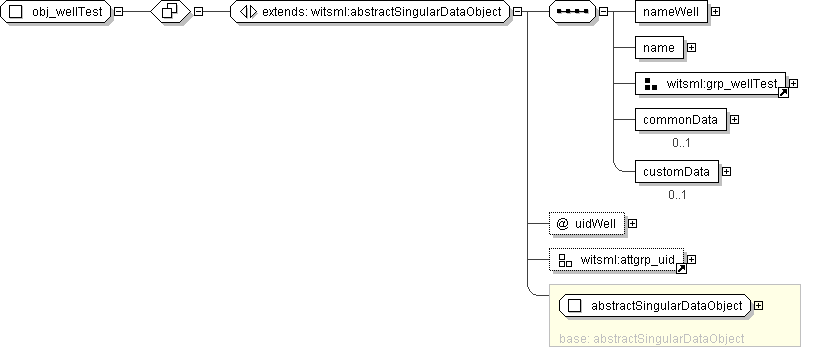
| Super-types: | abstractSingularDataObject < obj_wellTest (by extension) |
|---|---|
| Sub-types: | None |
| Name | obj_wellTest |
|---|---|
| Used by (from the same schema document) | Complex Type obj_wellTests |
| Abstract | no |
'Unique identifier for the well. This uniquely represents the well referenced by the (possibly non-unique) nameWell.'
"'The unique identifier of a container element. This attribute is generally required within the context of a WITSML server. There should be no assumption as to the semantic content of this attribute. This should only be used with recurring container types (i.e., maxOccurs greater than one). The value is only required to be unique within the context of the nearest recurring parent element.'
">'Human recognizable context for the well that contains the well test.'
'The minimum time index contained within the object. The minimum and maximum indexes are server query parameters and will be populated with valid values in a \"get\" result. That is, all wellTest for a well in the specified period defined by the min/max. See the WITSML API Specification appendix on \"Special Handling\" of growing objects for a description of the behavior related to this parameter.'
'The maximum time index contained within the object. The minimum and maximum indexes are server query parameters and will be populated with valid values in a \"get\" result. See the WITSML API Specification appendix on \"Special Handling\" of growing objects for a description of the behavior related to this parameter.'
'The definition of the \"current time\" index for this object. The current time index is a server query parameter which requests the selection of a single node from a recurring set (e.g., the data related to one point in a time series). That is, the \"most recent\" (at or before the specified time) wellTest for a well. See the WITSML API Specification appendix on \"Special Handling\" of growing objects for a description of the behavior related to this parameter.'
'Contextual data about the well that was tested.'
'The date-time of the previous well test.'
'The date-time of the last valid well test.'
'The reason for the well test: initial, periodic, revision.'
'DEPRECATED: use productionTest/wellheadData/chokeOrificeSize or injectionTest/chokeOrificeSize. The size of the opening in the flow choke at the wellhead.'
'A port on a Product Flow Unit that is represented by this test.'
'The Product Flow Unit represented by the port. This is defined within the Product Flow Model'
'The Product Flow Model that represents the above Product Flow Unit.'
'Defines the standard temperature and pressure to which all standard volumes in this report have been corrected. This applies to all elements whose name is suffixed by StdTempPres.'
'Data from a fluid level test.'
'Data from a production test. Multiple tests generally indicate that there are multiple components of a single overall test. For example, for multi-zoned wells.'
'Data from an injection test. Multiple tests generally indicate that there are multiple components of the overall test. For example, for multi-zoned wells.'
'A container element that contains elements that are common to all data objects.'
'A container element that can contain custom or user defined data elements.'
